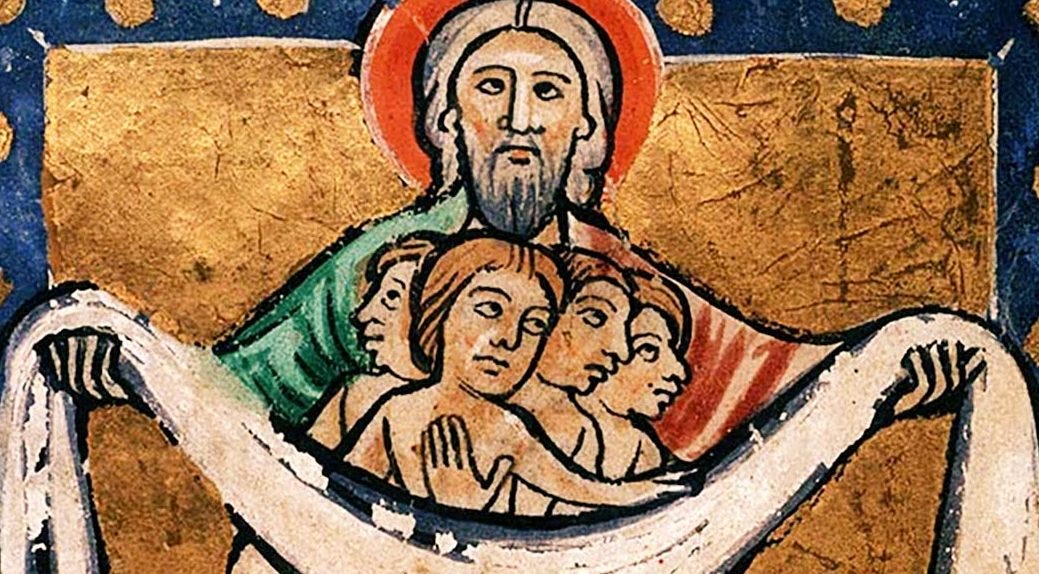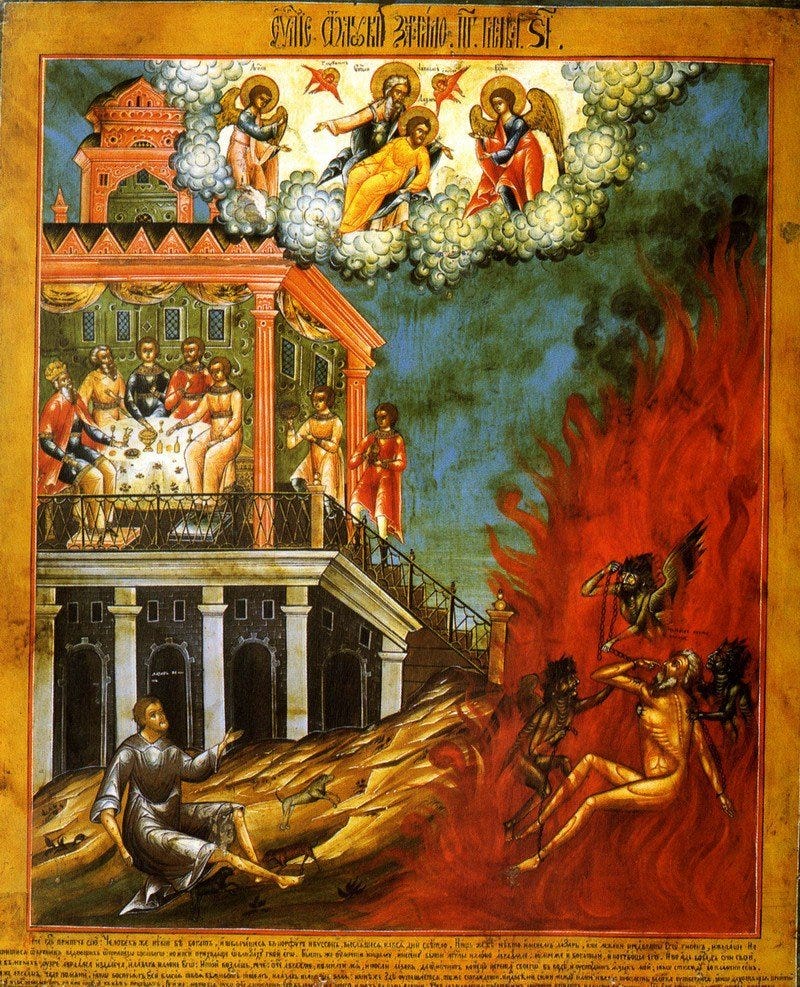Crossing the abyss
A sermon on the parable of the Rich Man & Lazarus
Psalm 91:1-6, 14-16 & Luke 19:19-31
The attentive among you will have noticed that the lectionary has slowly been walking us through the parables of Jesus in Luke’s Gospel these last few weeks. Well within earshot of His most infamous detractors, the Pharisees, Jesus has told story after story; tales about determined shepherds going to great lengths to find a single lost sheep; a woman and her missing silver coin; two lost sons – the younger lost in the heady daze of youth and greed, and the older lost in a self-righteous malaise of resentment as his gracious Father has the audacity to forgive the younger brother when he returns home having squandered his inheritance; and a tale about a shrewd steward who is rewarded by his master for his dishonesty. And as these stories unfold, they each get progressively more convoluted and scurrilous.
Like the Gospel of grace, Jesus’ storytelling is riddled with scandal, it never fails to get Him into trouble. The parables of Jesus are not stories about morality, who’s right and who’s wrong, or who’s in and who’s out. They are stories that invert our sense of morality and shatter our sense of justice. Because the parables are always about what the Kingdom of God is like. And the Kingdom of God is wholly unlike any of the Kingdoms we build for ourselves in this life. Which is why Jesus’ parables are so disorientating, they baffle and confuse, they knock us off kilter. And only when we allow them to derail us, can we begin to see what the Kingdom of God is like.
It’s all too much for the Pharisees who butt in and begin deriding Jesus. Luke tells us in the previous few verses that these Pharisees ridiculing Jesus
“were lovers of money.”
- Luke 16:14
The Pharisees get a bad rep in the Gospels. But they weren’t all as villainous as the Gospel writers make out. They are simply used as a polemical device against religious hypocrisy, but many had good faithful intentions. There were of course some who were hypocritical, corrupt, and greedy, and this is what prompts Jesus to paint a final vivid picture in this pericope of fables about two men.
A stark contrast is drawn between them. Jesus begins by supplying some biographical details; one, we’re told, was covered in fine purple linens. The mention of purple is not insignificant. The 4th century theologian, Ephrem the Syrian, noted that
“nothing is more honoured than purple clothing.”
Not least because it was the colour worn by the likes of the emperor, but also because it was incredibly difficult and time consuming to make the dye – known as Tyrian purple – which had to be extracted from the mucus glands of a particular species of sea snail.
By contrast, the other man is covered not in fine purple linens but in festering sores. While this made him an easy meal for the street dogs, who would lick his open wounds, we’re told that the first man feasted sumptuously every day. But just like the younger prodigal Son who, having squandered his inheritance, desired to eat the food of the pigs – the malnourished man peered through the gate to see the other on the far side, devouring his feasts like a pig.
The one man’s prosperity corresponds directly with the other’s poverty. But it’s not a wholly equal comparison, because only one of the men is given a name. The rich man is so identified with his wealth that all he has is his money, he doesn’t even have a name. As the church father Origen put it,
“he is named by what he loved.”
Lazarus on the other hand is given a name meaning
“God has helped.”
As it says in Proverbs 22:1,
“A good name is better than much wealth.”
The name “Lazarus” means everything that our reading from Psalm 91 means; shelter in the shadow of the Almighty, deliverance from the hunter’s snare and the deadly virus; refuge under God’s wings; liberty from fear; rescue; honour; and salvation.
Then Lazarus dies and is “carried away by the angels to be with Abraham”- a beautiful soaring description of his transition to the hereafter – whereas, the rich man we’re told in stark terms “also died and was buried.” To be buried was honourable at least, but to be lifted away in an angelic hearse far exceeds the honour of a dignified burial.
They wind up in Hades, the shadowy subterranean realm of the dead, which by this time had become synonymous with the Hebrew underworld sheol. But where once only a gate had stood between them, now an impassable abyss has been wrenched open with the nameless man in agonising in flames and Lazarus safe in the company of Father Abraham, the Jewish Patriarch.
Contrary to most English translations, the Greek text says that Lazarus was not simply at Abraham’s side, but
“…in Abraham’s bosom.”
This is far more intimate language; in the bosom of Abraham. In John’s Gospel this same word is used to describe the beloved Disciple who reclined on Jesus’ bosom at the dinner table, and in the prologue of the Gospel it’s used of Jesus Himself as the only Son of God who is in the Father’s bosom; or as it’s often translated,
“…is close to the Father’s heart.”
The rich man is found engulfed in flames, whereas Lazarus has been embraced by a Father.
Patriarch of the Jewish faith, Abraham is the one that God plucked – seemingly at random – out of obscurity from the land of Ur. God blessed Abraham, and made a covenant with him, a solemn vow that He would make the aged and impotent Abraham a Father, and not just any Father, but the Father of nations.
In the Rabbinic tradition, Abraham is especially noted for his exceptional hospitality. In Genesis 18 – in a subtle allusion to the Trinity – Abraham and his wife Sarah welcome and entertain three unnamed strangers into their tent, giving them bread to eat and wine to drink. That should sound familiar right? The three strangers in turn prophesy that within the year Sarah will indeed bear a son and thus fulfil God’s promise.
God has always been in the business of giving sons.
Abraham, the door of whose tent is always open, is the paradigm of hospitality. Whereas the rich nameless man would not open his gate to Lazarus, instead keeping him at arm’s length, and sooner stepping over him to go about his business than helping him. And so, in their death, the gate that the nameless man held shut to keep Lazarus at bay has erupted into a chasm of tectonic proportions. As the church Father, Gregory of Nyssa put it,
“[The rich man] produces for himself a place empty of good hereafter. He digs this unavoidable necessity for himself like some deep and trackless pit.”
And to make matters worse, even here, even in the flames, he then demands hospitality from Lazarus, calling out and beckoning Abraham to send Lazarus over the chasm to slake his thirst with a drop of water on his tongue; this guy’s got some nerve. Lazarus had been nothing but his doormat and now he expects to be attended by him. As you might expect, Abraham’s response is somewhat cold,
“You’ve had your chance, you had everything life could offer, and you failed to offer it to the one who had nothing but misery.”
The rich nameless man then pleads for his brothers, to which the Patriarch simply points to the law of Moses and the Prophets, Israel’s Holy Scriptures, to say that everything he needed to know, all that his brothers need to know about living a virtuous life and avoiding the self-inflicted fiery reckoning that he had forged for himself by his inhospitable gluttony, is to be found there. All throughout the Hebrew Scriptures, that which we unfortunately call the “Old Testament” God is deeply concerned about the poor, the vulnerable, the lost, the needy, and the oppressed.
The nameless man gives this very interesting response,
“If someone from the dead goes to them, they will repent.”
And Abraham’s response is equally telling,
“If they do not listen to the Scriptures, they will fail to be convinced of someone rising from the dead.”
And here endeth the tale.
We could leave it there, perhaps in fear and trembling lest we who live here in the west in our relative comfort and wealth – we who by virtue of where we live are amongst the top 1% of wealthiest people in the world, up there with the billionaires – should suffer the same fate as this nameless rich man.
Perhaps that is the message we need to hear today.
But, there’s more to be said. Because we have thus far neglected to tell the most important thing about this parable. The most important thing about this story, is the storyteller himself.
When read in the light of the scandal of the cross, to which this parable and all the Scriptures point, the story begins to look different. Again, this and the other parables are not premonitions of the final fate of human beings, they are not about who gets in or out. They tell us what the Kingdom of God is like. We might well try to assess who we are in the story and automatically place ourselves in the position of the inhospitable nameless man who had nothing but money to his name. And that’s true, we are that man. But we are also Lazarus, we are those who could not help themselves, we are those in need of rescue. Abraham said to the rich man,
“If they will not listen to the Scriptures, neither will they be convinced of someone raised from the dead.”
What Abraham fails to mention, is that one man, God incarnate no less, should be the one raised. But more importantly than that, however, is that this man raised – our storyteller – is not raised without first descending! We affirm this every time we recite the Apostle’s Creed, “descendit ad inferos”…
He descended to the dead.
The storyteller has stormed the gates of Hell, descended to the fiery depths, and therein lain his own body to bridge the impassable abyss, so that all should pass over into the embrace of His gracious Father’s bosom. Without Jesus, the parable is nothing but bad news. Because of Him, it’s good news.
Amen.





